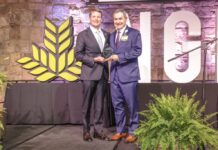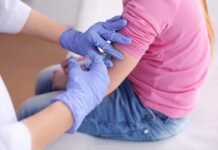In recognition of National Stroke Awareness Month, Habersham Medical Center is helping to spread the word about the warning signs and symptoms of strokes. About 795,000 people in the United States will have a stroke this year. Yet most people cannot identify stroke warning signs or risk factors and some studies indicate that up to 80 percent of strokes can be prevented.
“One of the confusing things about a stroke is that its symptoms – such as slurred speech, dizziness, numbness and altered vision – may be relatively mild,” says Teri Newsome, director of quality and patient safety at Habersham Medical Center. “Many times with a stroke,” adds Newsome, “people are waiting hours before they seek treatment thinking the symptoms will go away. For every second a person waits without seeking treatment, brain cells are lost. If you think you are having a stroke, fast response is critical, so call 9-1-1 immediately.”
As patients are being transported to Habersham Medical Center’s Emergency Department by ambulance, paramedics begin life-saving treatment and signal to the Emergency Department staff that a stroke victim is in route. At Habersham Medical Center, a Code Stroke is called and the stroke team activates and clears the CT scanner, where the patient is rushed upon arrival.
“Within minutes, our diagnosticians analyze the patient’s CT scan of the brain to ensure there is no internal bleeding and begin treatment. If the stroke is caused by a blood-clot, the patient may be a candidate for the clot-dissolving drug Tissue Plasminogen Activator (tPA). But tPA must be administered within a few hours from the onset of the stroke to reduce potential complications,” says Newsome.
Stroke risk factors
Stroke risk factors include high blood pressure, stress, high blood cholesterol levels, smoking, sleep apnea and being overweight. And to reduce your chance of a stroke, eat a healthy diet, get regular exercise and see your physician for regular check-ups.
Stroke warning signs:
- Sudden numbness or weakness of the face, arm or leg, especially on one side of the body;
- Sudden confusion, trouble speaking or understanding;
- Sudden trouble seeing in one or both eyes;
- Sudden trouble walking, dizziness, loss of balance or coordination and/or
- Sudden, severe headache with no known cause.
Use F-A-S-T to remember the warning signs of stroke:
Face: Ask the person to smile. Does one side of the face droop?
Arms: Ask the person to raise both arms. Does one arm drift downward?
Speech: Ask the person to repeat a simple phrase. Is their speech slurred or strange?
Time: If you observe any of these signs, call 9-1-1 immediately.
Free stroke support group
A Certified Primary Stroke Center by the Joint Commission, Habersham Medical Center has received national and state recognition for excellence in stroke care including an award from the American Heart Association and from the Georgia Hospital Association.
Habersham Medical Center also offers a free stroke support group for stroke survivors and their family members. For more information or to register, call (706) 754-3113, ext. 2821.
About Habersham Medical Center:
Recognized throughout the state for innovative award-winning patient care, Habersham Medical Center offers Northeast Georgians a full-range of award-winning healthcare services in a newly-expanded modern facility. In addition to emergency, diagnostic and inpatient services, Habersham Medical Center also offers a pain management clinic; a sleep lab; HCMC Home Care; the Total Fitness Exercise Facility; physical, speech and occupational therapy; a primary care clinic called Prime Care, WorkWise Occupational Health and more. For more information, visit www.habershammedical.com.







